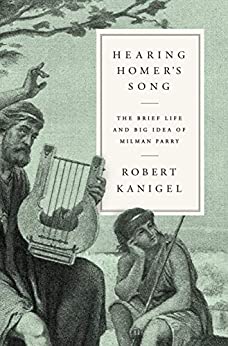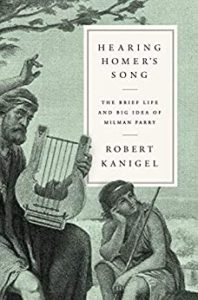By Stas Margaronis
For centuries people believed that a poet named Homer wrote the epic poems the Illiad and the Odyssey, the foundations of literature in Western Civilization. However, in 1923 a young University of California classics student argued, in his master’s thesis, that the true authors derived from a “traditional’ process.[1]
In his thesis Millman Parry asserted:
“Just as the story of the Fall of Troy, the tale of the House of Labdakos , and the other Greek epic legends were not themselves original fictions of certain authors, but creations of a whole people, passed through one generation to another …”[2]
In addition to studying Greek classics, including the Illiad and the Odyssey, Parry also studied anthropology at the University of California. He was inspired by his anthropology professor, Albert Kroeber, who had written a history of lost Native American culture in Northern California. Kroeber provided Parry with insights that he would employ to analyze traditional cultures and their means of communication. This, in turn, helped focus his attention on stories and poems sung by bards that were handed down from generation to generation before the written word was invented.
Robert Kanigel’s biography, “Hearing Homer’s Song: The Brief Life and Big Idea of Milman Parry”, follows the young Californian from his student days at the University of California, Berkeley to Paris where he studies and writes his PhD thesis.
In 1928, Parry amplified on his earlier assertions while writing his PhD thesis at the Sorbonne in Paris. Kanigel tells us that five scholars influenced his research. They helped him better understand the oral improvisations within the Homeric poems, introduced him to the richness of illiterate cultures and encouraged him to study the oral poetry of the guslars resident in what was then Yugoslavia.
One of the scholars, who acted as a juror and who ultimately approved Parry’s thesis defense, was Antoine Meillet, who found:
“not so much a hole in Parry’s thesis as a door through which he might wish to step. What Parry had done at Cal, (the University of California) and now more definitively in Paris, showed that the Odyssey and the Iliad were the product of traditional cultures working, somehow, in traditional ways. But missing from Parry’s formulations, Meillet held, was that this traditional style was probably the work of oral poets – oral poets like those who sang Yugoslavian epic songs Professor Murko (another juror, Slovenian, and a specialist in the epic poetry of Yugoslavia) had long studied. … And if Parry wanted to see for himself that this was true, and, if so, how it worked, he needed to go where such singers and poets could still be found.” [3]
In 1934-1935 Parry traveled to Yugoslavia. Kanigel relates that “… Heroic songs that Perry gathered” were “sung in the Balkan lands by singers known as guslars, who accompanied themselves on the distinctive stringed instrument of the region known, as the gusle. A gusle was a single string of horse hair …”[4]
His interviews and recordings of these oral poets provide the evidence that the Iliad and the Odyssey were the product of singers and bards, who recited their tales using a fixed oral/poetic format, including the use of the epithet creating “an element of nobility and grandeur” to their renditions. Listening to the guslars gave Parry the ability to hear and analyze how the oral poetic process evolved and how it would have been used to sing the Illiad and the Odyssey.
In one example, Parry discovers: “That an illiterate Muslim singer, a butcher by trade, could sit down and recite thousands of lines of verse, forming a colorful and substantial work that might reasonably be compared with Homer, helped corroborate Parry’s ideas about the origins of Homer and, more broadly, about the legitimacy and worth of orally composed poetry.”[5]
This discovery will redefine literature as both a lyrical and written means of expression.
Tragically, the proof of his thesis, based on the recording and analysis of the guslars’ songs, was stymied by Parry’s mysterious accidental gun-shot death in a Los Angeles hotel room in 1935.
The publication of Parry’s work would then fall on the shoulders of his assistant Albert Lord. Lord suffered a nervous breakdown and spent years working in a U.S. Navy shipyard, before he returns to his scholarship and publishes his magnum opus, the Singer of Tales in 1960, which begins:
“This book is about Homer. He is our Singer of Tales. Yet, in a larger sense, he represents all singers of tales from time immemorial and unrecorded to the present. Our book is about these other singers as well. Each of them, even the most mediocre, is as much a part of the tradition of oral epic singing as is Homer, its most talented representative.”[6]
FOOTNOTES
[1] Robert Kanigel, Hearing Homer’s Song: The Brief Life and Big Idea of Milman Parry (2021), p. 63
[2] Ibid.
[3] Kanigel, pp. 129-130
[4] Kanigel, p. 177
[5] Kanigel, p.229
[6] Kanigel, p.252


